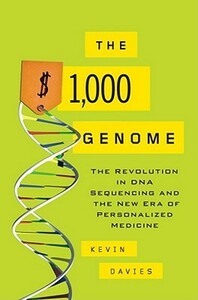Take a photo of a barcode or cover
7 reviews for:
The $1,000 Genome: The Revolution in DNA Sequencing and the New Era of Personalized Medicine
Kevin Davies
7 reviews for:
The $1,000 Genome: The Revolution in DNA Sequencing and the New Era of Personalized Medicine
Kevin Davies
A decent intro to the $1,000 genome -- a bit about the science and the bioethics and the implications of a $1,000 genome, mixed in with *plenty* (a bit too much, IMHO) about the "business" side of things. The book is mostly structured around the people involved: the initial pioneers, company founders, early adopters; their ideas, their plans, their regulatory and financial battles, etc. The chapters were relatively disconnected from one another, which didn't bother me much. Unfortunately, just 3.5 years after it was published, it's already starting to be a bit out of date in a fast-moving field -- I found myself Googling for the current status of legislation and companies (some of which have gone out of business or changed drastically since the book was published). It will always provide a good overview of that particular (startup-based) era of personalized medicine, though.
Pretty good. It definitely does a good job of giving you an overview of what's going on in the world of personal genomics and how the price of sequencing is dropping. However, it doesn't do a spectacular job of presenting facts in a way that gets them to stick in your head. Still, if you're interested in the topic, it's worth reading.
Interesting history of gene sequencing and the trends towards faster cheaper full genome sequencing. Of course the question is now what? Apart from providing an interesting history of the human species, how do we use this knowledge to make life better? Lots of opportunities, but still a technology searching for a problem to solve. Somehow this will be useful in helping target medicines to appropriate patients.
good overview of history of sequencing industry.. at least I think/trust that it was. but also a slog to get through and written in a way where I'm not going to remember the companies or dates; it's all just jumbled in my head.
6/10. This book dove into the science of genomes and personalized medicine. I liked the discussion of what we can and can't learn from DNA sequencing and the development of different companies. However, I wish there was more in depth information about the sequencers. Additionally, this book is a bit out of date now. Some of the predictions for 2020 were not true simply because the book was written 10 years ago. If updated today, it might be much better.
Very good for giving the overview of the BioTech industry as it applies to the Human Genome sequencing race and the potential for use of this information in the future for Personalized Medicine. Wish it had more details on the next gen sequencing technologies.

